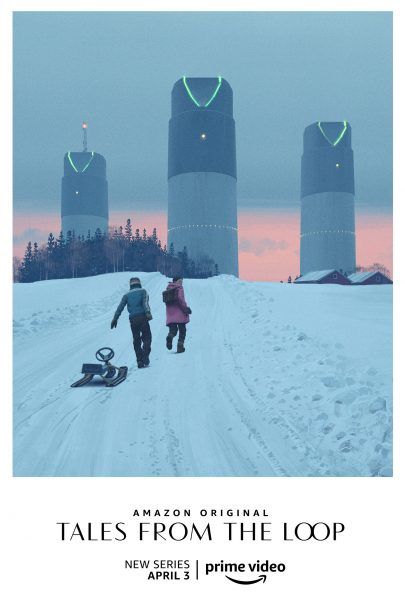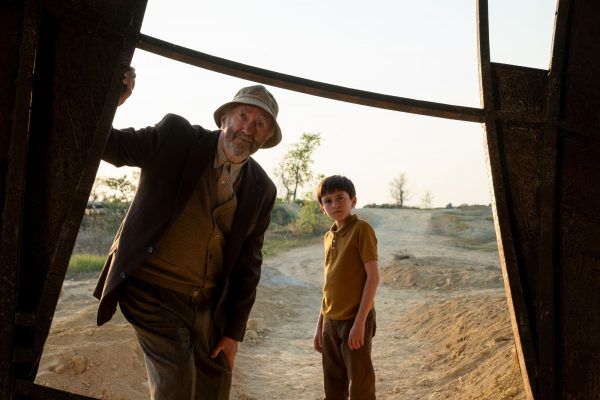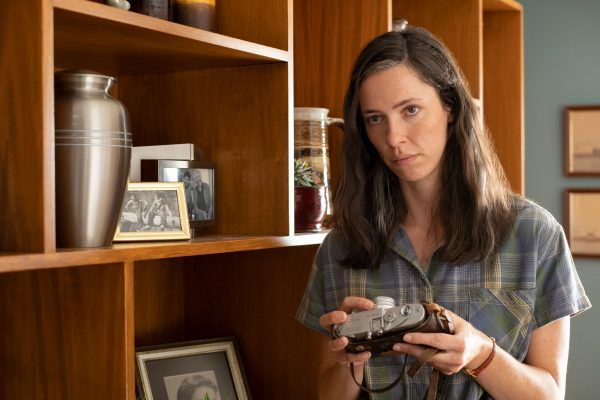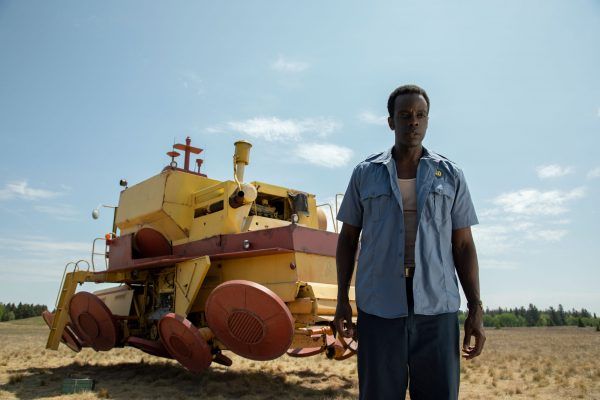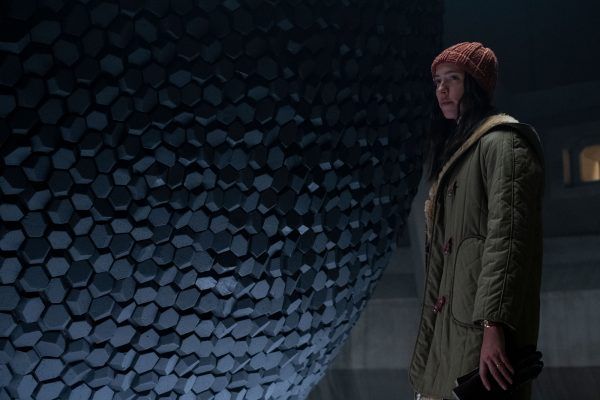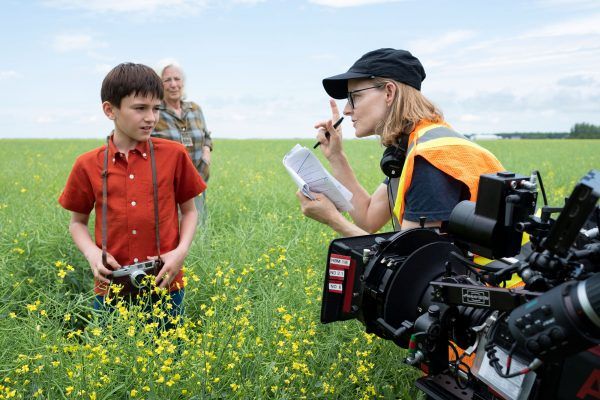One of the very first things I remember reading about Tales from the Loop when news first broke that a series adaptation was in the works was how it could be Amazon’s answer to Stranger Things. At the time, it made some sense connecting the dots given the fact that Tales from the Loop has sci-fi elements, an 80s tinge, and there’s also a popular tabletop role-playing game based on Simon Stålenhag’s original artwork. But now that I’ve seen Episodes 1, 4 and 6, it’s abundantly clear that Tales from the Loop is very much its own, highly unique thing.
The show is a feast for the eyes that takes place in a town built around a machine called The Loop, a device designed to “unlock and explore the mysteries of the universe.” Tales from the Loop stars Rebecca Hall, Paul Schneider, Jonathan Pryce, Daniel Zolghadri, Jane Alexander and Duncan Joiner in a series of stories that, as showrunner Nathaniel Halpern put it, “are single stories that do amount to a bigger tapestry of a town.”
I can assure you, you’ve never seen anything quite like Tales from the Loop, so it was a real treat to get to hop on the phone with Halpern after sampling a little of Season 1 of the show. Check out our conversation below to find out what he thought about the early Stranger Things comparisons, how involved he was in every single episode, how the show’s approach to the sci-fi elements stands out from other sci-fi shows we have right now, and loads more.
Tales from the Loop arrives on Amazon on April 3rd.
Even though you've worked on so many other shows, was there anything about the showrunning process that really took you by surprise?
NATHANIEL HALPERN: No, I was quite fortunate on Legion; I was heavily involved in the day to day production aspects so there was a little bit of training wheels on that series. So I think anything that caught me by surprise is it was somewhat unique in what I took on myself in that I wrote all eight and I oversaw every shot. So I certainly was spread quite thin, but I didn't see any other way to approach this one.
What about learning from Legion from a story telling perspective? This is the only descriptor coming to mind right now, but both shows are kind of trippy. Did you learn anything from Legion in that sense?
HALPERN: They're quite different. I was trying to tell, with Loop, kind of simpler stories, really strip things down. There are what you might call surreal or trippy elements to it. That's just kind of the nature of how my mind works. [Laughs] But Legion was a very different beast, so I don't see too many crossovers aesthetically or storytelling-wise, but maybe someone else does and I'm blind to that.
You said you veer towards surreal or trippy stories. When did you first realize that interested you? Was there a specific thing back in the day that made that click and made you think, ‘These are the stories I’m drawn to?’"
HALPERN: No, not necessarily because my case is all over the map. I think, honestly, the potential I see in the genre is I really like to tell emotional and poignant stories. And I think a lot of times, the genre aspect allows the viewer a way in, where they might hesitate at first if they know it's gonna be about something particularly emotional. I don't want to say it tricks the audience, but I think it allows them to entertain certain emotions they might not if it was just a straight drama. And it gives you the liberty to explore that. So I think early on I saw the potential of that, and it certainly has come into full bloom here with Tales from the Loop.
I know the show is largely inspired by the artwork, but did you leave this experience with any advice for someone who might want to adapt a tabletop role playing game?
HALPERN: Yeah, so my answer to this is, I've never seen a role playing game, so I don't have any exposure to it. That is based on the paintings, and the show is also based on the paintings so they didn't cross pollinate at all. So I don't have any advice for anyone adapting a role playing game. But I'll say, what was wonderful about adapting something that was purely visual was, it made the tone so important. There was a tone, a mood and atmosphere that serves as the basis of the world of the show, which is so important to me creatively. So I think that that's the advantage of adapting something that's visual.
I feel like they should make a behind the scenes featurette of you giving the role playing game a shot for the first time!
HALPERN: Oh, that'd be funny at this point. Yeah! Because I didn't want it to influence the storytelling, but yeah at this point I'm sure I could get exposed to it and I'd be fine.
What about infusing your storytelling with a participatory quality? There is something about the few episodes that I watched that do encourage you to wonder, ‘What would I do if I encountered this particular thing or situation?’ Was that on your mind while writing?
HALPERN: Yeah, I would say the way to answer that would be, I wanted to tell emotional, poignant stories that people can relate to. And you just said it very nicely, that question of like, ‘What would I do?’ And I think that's a sign that you're relating to the character and you're emotionally invested, versus just being mildly amused by the plot turns. So, I was certainly thinking a great deal about that aspect of it, of wanting people to experience it or have the stories remind them of their own experiences in life and think back, ‘What would I have done?’ Or, ‘Oh, maybe I would have done this differently," and really experience the series on a personal level.
Did you find any particular character perspective the most challenging to write?
HALPERN: Interesting question. No, not really. Nothing leaps out at me. I think at the end of the day, these characters all fall under an emotional umbrella that I can comprehend and relate to. So yeah, no particular character pops out at me. I think writing children, perhaps, is just policing yourself. I tried to remember as much as [I could about myself] being a kid. I find a lot of times depictions of kids don't ring true to me, and my own experiences. There's an idealization of those years that I just think rings false. And here, I think that probably was the thing that presented the most difficulty is just remembering, what did that feel like? And trying to stay true to that.
One of the very first things I remember reading about this show when it was first announced was that some were calling it Amazon's answer to Stranger Things. What would you say to someone who might be getting ready to watch the first episode with that in mind? Is that a fair assessment, or would you urge them to consider another style or format instead?
HALPER: Well, whatever brings people to the show. As long as they come, I'm okay with that. But I would say this is a far cry from Stranger Things tonally, aesthetically, and in its storytelling. So I think it's not the best comparison if you're coming in with those expectations because they're trying to do something very different than I am.
How about some of the sci-fi and futuristic technology? We’ve got a good deal of that in other shows right now, like Black Mirror for example. What is it about Tales from the Loop that really makes it stand out from the pack?
HALPERN: Yes, actually. [Laughs] I'm a big fan of the genre, but I find so much of science fiction these days is cynical, or it's there to make us feel anxious or fearful or angry. And what I wanted to do was, how could you use the genre to actually provide a bit of comfort or a bit of hope, and be poignant? And not just feed on anxiety. I think there's enough of that going around. So it really is a genre series where the genre is there to amplify emotion, and the poignant nature of these characters' journeys versus being about a conspiracy or a mystery or how awful everything is. That just didn't interest me in this world.
What about the idea of giving viewers firm answers? What kind of conclusive feeling do you want viewers to walk away from Season 1 with? And does the story wrap up in any sense?
HALPERN: Yes, because it is a somewhat unique structure, which I find exciting in that, it is a serialized show but the individual episodes have a film quality in that they feel like a complete piece, a complete story versus regularly where episodes just kind of domino into each other. Here you have the benefit of a larger serialized storytelling but also the quiet crafted singular pieces. So it certainly wraps up and will be satisfying by the end in terms of, it's not a mystery show, but any loose threads are kind of tied off. So, yeah. But I think it'll take a minute for people to understand the structure of it in that we are loosely following this one family, but various characters step up to have their stories told. And it's not traditional, in that sense.
When you first pitched the show, did you just pitch one season or did you have to have multiple seasons mapped out for Amazon?
HALPERN: Well, you know it's interesting because the nature of the structure is, the structure itself is a storytelling generating device. You have this Loop facility, which can provide endless permutations of stories you could tell. And this goes back to the oddness of, these are single stories that do amount to a bigger tapestry of a town, and a place. So this can go on indefinitely. Versus a usual show, where it's highly serialized and you really have to see how this maps out and how these story threads move forward. Because here, also, a little bit of the alchemy of this is, something extraordinary happens to someone who’s ordinary and once multiple things that are extraordinary happen to someone who is ordinary? They're no longer ordinary. So you can't really relate to them at that point because they have such a convoluted backstory. So the structure dictates that we cycle in new characters while keeping old characters around so we can have that sense of wonder of someone stepping out of their regular life.
You were talking earlier about overseeing all of the shots. I was wondering how your directors responded to that and what that kind of collaboration like?
HALPERN: My aim was to make something that was highly cinematic and not dialogue driven, which you don't see very often these days, sadly. And so, it's a visual medium. And these directors who are all wonderful and I either had pre-existing relationships with, had worked with them before, or I met with them and we were very like minded. They were just wonderful collaborations so what they brought to the table was invaluable. And I was there, especially on a first season show, to be that consistent voice and eye. Especially since the standalone nature of all the episodes, keeping that tone and aesthetic consistent throughout, so it all feels like a single piece. And so yeah, it was just wonderful collaborations with all these directors.
And why did you pick Mark [Romanek] to establish that visual language with you for Episode 1? Is there anything particular about him and his work that made him the one to kick it all off with you?
HALPERN: I met with Mark; I can't say enough good things about Mark. And we just saw eye to eye on so much about aesthetics and film and our taste. We're very aligned. So he was just this wonderful partner in creating the aesthetic of the world and I loved the way he had treated genre in Never Let Me Go where it didn't overwhelm the characters. So it was a very emotional story that had science fiction elements. There was a bit of a balance that I was trying to chase. So it was just so wonderful and I was so fortunate to have him come in and start the show out of the gate.
And who else do we have here? I know Jodie Foster and Andrew Stanton are involved.
HALPERN: Andrew Stanton? Wonderful! I'd worked with him on Legion and obviously he has that Pixar background. The emotional storytelling that’s told in those films was kind of a nice template. And so I just worked really well with him on Legion. Unlike a lot of shows, these scripts were done well in advance so the directors had the scripts months before they started shooting. So there was a wonderful amount of thoughtful prep that could go into it. So, Andrew and I were talking for quite a while before he showed up on set, and he just brought a wonderful sense of magic and wonder to that episode, and I'm very proud of what he did there.
And Jodie is another one. I hadn't known her prior to this, but we met and got along really well, and saw eye to eye on things. And she was just a wonderful artist to work with. She's legendary in this business, and it was just a privilege to work with her. And she brought just a thoughtfulness and a sensitivity to that final episode that just took it to the next level. So she was wonderful to work with.
If you could step into the world you created and walk out with any one thing, any piece of technology, what would you choose and why?
HALPERN: Oh, boy. [Laughs] Wow, that’s a hard one. Hold on. I almost got it. [Laughs] Just going through the episodes here. Well, you haven't seen this episode but maybe the Scrapper, this giant remote controlled robot that you have a backpack and a glove that mimics your movements. I might take that.
Tales from the Loop premieres on Amazon Prime on Friday, April 3rd.


